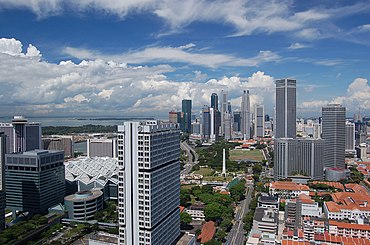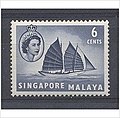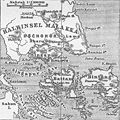 Map of Singapore Singapore, officially the Republic of Singapore, is an island country and city-state in Southeast Asia. The country's territory comprises one main island, 63 satellite islands and islets, and one outlying islet. It is about one degree of latitude (137 kilometres or 85 miles) north of the equator, off the southern tip of the Malay Peninsula, bordering the Strait of Malacca to the west, the Singapore Strait to the south along with the Riau Islands in Indonesia, the South China Sea to the east, and the Straits of Johor along with the State of Johor in Malaysia to the north.
Singapore's history dates back at least eight hundred years, having been a maritime emporium known as Temasek and subsequently a major constituent part of several successive thalassocratic empires. Its contemporary era began in 1819, when Stamford Raffles established Singapore as an entrepôt trading post of the British Empire. In 1867, Singapore came under the direct control of Britain as part of the Straits Settlements. During World War II, Singapore was occupied by Japan in 1942 and returned to British control as a separate Crown colony following Japan's surrender in 1945. Singapore gained self-governance in 1959 and, in 1963, became part of the new federation of Malaysia, alongside Malaya, North Borneo, and Sarawak. Ideological differences led to Singapore's expulsion from the federation two years later; Singapore became an independent sovereign country in 1965. After early years of turbulence and despite lacking natural resources and a hinterland, the nation rapidly developed to become one of the Four Asian Tigers. As a highly developed country, it has one of the highest GDP per capita (PPP) in the world. It is also identified as a tax haven. Singapore is the only country in Asia with a AAA sovereign credit rating from all major rating agencies. It is a major aviation, financial, and maritime shipping hub and has consistently been ranked as one of the most expensive cities to live in for expatriates and foreign workers. Singapore ranks highly in key social indicators: education, healthcare, quality of life, personal safety, infrastructure, and housing, with a home-ownership rate of 88 percent. Singaporeans enjoy one of the longest life expectancies, fastest Internet connection speeds, lowest infant mortality rates, and lowest levels of corruption in the world. It has the third highest population density of any country in the world, although there are numerous green and recreational spaces as a result of urban planning. With a multicultural population and in recognition of the cultural identities of the major ethnic groups within the nation, Singapore has four official languages: English, Malay, Mandarin, and Tamil. English is the common language, with exclusive use in numerous public services. Multi-racialism is enshrined in the constitution and continues to shape national policies in education, housing, and politics. Singapore is a parliamentary republic in the Westminster tradition of unicameral parliamentary government, and its legal system is based on common law. While the country is de jure a multi-party democracy with free elections, the government under the People's Action Party (PAP) wields widespread control and political dominance. The PAP has governed the country continuously since full internal self-government was achieved in 1959, and holds a supermajority in Parliament. One of the five founding members of ASEAN, Singapore is also the headquarters of the Asia-Pacific Economic Cooperation Secretariat, the Pacific Economic Cooperation Council Secretariat, and is the host city of many international conferences and events. Singapore is also a member of the United Nations, the World Trade Organization, the East Asia Summit, the Non-Aligned Movement, and the Commonwealth of Nations. (Full article...)Selected article -Sungei Road (Chinese: 双溪路) is a road in Singapore situated between Serangoon Road and Jalan Besar and runs along the Rochor Canal. The area around Sungei Road formerly housed affluent Europeans and Asians, and many ornately designed buildings were built there. Since the 1930s, the road has been synonymous with Sungei Road laksa (a local spicy noodle soup) and the Thieves' Market, the largest and oldest flea market in Singapore, where locals can shop for old bric-a-brac or second-hand goods. The market was permanently closed on 10 July 2017 for "future residential development use". (Full article...) Selected picture The Downtown Core is a 266-hectare urban planning area in the south of the city-state of Singapore. The Downtown Core surrounds the mouth of the Singapore River and southeastern portion of its watershed, and is an integral part of the Central Area. Read more... General imagesThe following are images from various Singapore-related articles on Wikipedia.
Selected biography -Balaji Sadasivan (/ˈbɑːlədʒiː sɑːdəˈsiːvən/ or /ˈbæ- sæ-/; 11 July 1955 – 27 September 2010) was a Singaporean politician and neurosurgeon. He attended Raffles Institution, Siglap Secondary School and National Junior College, and studied medicine at the University of Singapore. After graduating in 1979, he continued his education at the Royal College of Physicians and Surgeons of Glasgow, becoming a Fellow of the Royal College of Surgeons (FRCS) in 1984. He also trained at the Henry Ford Hospital in Detroit, Michigan, from 1985 to 1989, and became a Fellow of Harvard University in 1990. He worked as a neurosurgeon until 2001, publishing over 50 book chapters and journal articles. In 2001 Balaji was elected to the Parliament of Singapore for the Cheng San–Seletar division of the Ang Mo Kio Group Representation Constituency. From then until his death he served as Minister of State for the Ministry of the Environment (2001–2003), Ministry of Health and the Ministry of Transport (2001–2004); and subsequently Senior Minister of State for the Ministry of Health (2004–2006), the Ministry of Foreign Affairs (2006–2010) and Ministry of Information, Communications and the Arts (2004–2008). In 2007, he was appointed chairman of the executive board of the World Health Organization. In March 2008, Prime Minister Lee Hsien Loong reshuffled his cabinet, from which time Balaji retained only his portfolio at the Foreign Affairs Ministry until his death in 2010. (Full article...) Did you know (auto-generated)
In this month
More did you know -
Selected panoramaVivoCity (Chinese: 怡丰城) is the largest shopping mall in Singapore, located at the HarbourFront precinct . Opened on 7 October 2006, it marked the completion of the main structure by a topping-out ceremony on 18 April 2006 and was officially opened on December 1, 2006. Singapore topicsRelated portalsSoutheast Asia Other Countries Tasks
CategoriesWikiprojectsAssociated WikimediaThe following Wikimedia Foundation sister projects provide more on this subject:
Discover Wikipedia using portals |































































